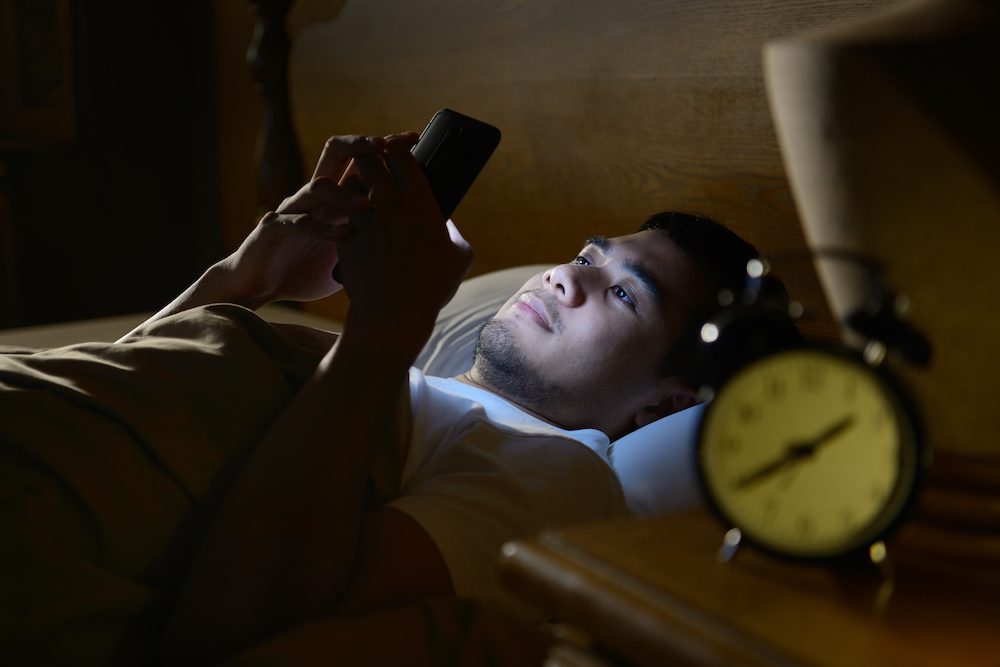Your sleep schedule is when you go to bed and wake up every day. Having a consistent sleep schedule is an important part of getting your recommended seven to nine hours of sleep a night.
Many of us find our sleep schedules get thrown off from time to time. Maybe your social calendar is packed or you have a new job. Perhaps you just wake up early during the work week and sleep late on the weekends.
Whatever the reason your sleep schedule may be off, it’s possible to reset it through a variety of lifestyle changes. These can include having a regular bedtime routine, avoiding screens at night, and altering your caffeine and alcohol intake, among others.
A consistent sleep schedule conveys many benefits, like having an easier time falling asleep and more energy during the day. We cover tips for how to reset your sleep schedule, why it’s important to do so, and common reasons why a sleep schedule might be disrupted.
Top 4 Tips to Change Your Sleep Schedule

- 1 Learn about your chronotype and change your routines to accommodate it.
- 2 Timed exercise and exposure to bright light can help reset your sleep-wake cycle.
- 3 Allow at least a week to adjust to a new sleep schedule and gradually make changes each day.
- 4 Fall asleep faster by making your bedroom distraction-free and improving sleep hygiene.
Circadian rhythms control our sleep-wake schedules, but they are easily disrupted by travel, work, and even household lights.
Tips for Resetting Your Sleep Schedule
There are a number of sleep hygiene practices you can try out to help you reset your sleep schedule.
Establish Consistent Sleep and Wake Times
The key to resetting your sleep schedule is to calculate when you’d like to go to bed and wake up, and then stick to these times as much as possible, even on weekends. It usually helps to first think of when you need to wake up. Then work backward and pick a bedtime that allows for enough hours asleep.
It can be helpful to take a step-by-step approach to fixing your sleep schedule your sleep schedule, especially if you plan to make a substantial change. You’re likely to feel frustrated if you suddenly move your bedtime from 2 a.m. to 9 p.m. Make incremental changes over time with the ultimate goal of establishing a regular sleep schedule.
Create a Bedtime Routine
A relaxing bedtime routine can help you fall asleep more easily at the same time every night. Try quiet activities in the evening, like reading, stretching, listening to music, or taking a shower. Whatever you choose, try to have a similar routine every night. Your routine will signal your body that it’s time for bed.
Relaxation techniques can also help calm your mind to get ready for sleep. Deep breathing, meditation, or muscle relaxation can help you feel ready for bed and quell any racing thoughts that might keep you awake.
Review Your Bedroom Environment
Your bedroom environment has a lot to do with whether or not you can settle down for sleep at the same time every night. First, make sure your bedroom is primarily used for sleep. If you use your bedroom to watch TV or work, you’re less likely to associate it with sleep.
Then check to see if the bedroom environment itself is conducive to sleep. It should be relatively dark, quiet, and cool, ideally around 65 to 68 degrees. Choose a mattress, pillow, and bed linens that are as comfortable for you as possible.
Be Mindful About Light Exposure
Exposure to light at different times of day influences your internal clock, which in turn regulates when you feel tired or awake. Getting some sunlight during the day, especially first thing in the morning, signals your body that it’s time to be awake. If you’ve given yourself a new, earlier wakeup time, try drinking your morning coffee outside or near a sunny window.

Light at the wrong time can also throw off your internal clock. If you find yourself scrolling on your phone before bed, you might want to try reading a book instead. That’s because the blue light emitted by phones and other devices mimics sunlight, telling you it’s time to wake up rather than settle down for bed.
Make Some Lifestyle Changes
Altering a few of your decisions during the day might make it easier to stick with a sleep schedule.
First, try avoiding caffeine late in the day, such as after 2 p.m. Caffeine is a stimulant that stays in your system for hours after you consume it. In fact, it takes about six hours for half the caffeine in your system to clear out. A cup of coffee in the afternoon may mean you can’t settle down to go to sleep when you’d like to.
You might also want to avoid alcohol too near to bedtime. It’s true that alcohol can make you drowsy enough to fall asleep. But it also interferes with your stages of sleep and keeps you from getting the deep sleep you need. This means it can lead to fitful sleep and make it harder to get up at your desired time.
In addition, you may want to be mindful about the time of day you exercise. Exercise can help you fall asleep at night because it tires your body out. But intense exercise too close to bed might keep you awake. Try sticking to a morning or afternoon workout regimen.
Customize to Your Life
As always, seek to apply these tips in a way that works for your life. For example, if you naturally stay up late and don’t need to be up early during the day, feel free to go to bed later and wake up later, as long as you’re getting your recommended hours of sleep.
Consistency is key when it comes to having a regular sleep schedule, but don’t fret if you stay up late watching a movie one night. Just aim for consistency most of the time.
Why Is a Sleep Schedule Important?
A consistent sleep schedule helps ensure you get the right amount of sleep each night. What’s more, going to sleep and waking up around the same times every day helps train your body to fall asleep and wake up when you want it to.
Many of us had non-negotiable bedtimes when we were kids, and for good reason. Kids thrive with a routine, and so do adults. When you do the same thing every day around the same time, it becomes a habit. Habits make life easier because they’re virtually automatic.
What’s more, having a regular sleep schedule can help align systems in your body that signal when it’s time to go to sleep and wake up. Your body has 24-hour cycles called circadian rhythms, the most well-known being the sleep-wake cycle. Having a regular sleep schedule helps align your sleep-wake cycle with your drive for sleep.
So, when you go to bed at 10 p.m. every night, eventually your body learns that 10 p.m. is bedtime. Then it becomes easier to fall asleep when you lie down at night. And if you set your alarm for 6 a.m. every day, you can be more confident of getting a full night’s sleep.
Impacts of Sleep Deprivation
One of the consequences of an irregular sleep schedule can be sleep deprivation. Not getting enough sleep can seem like just a nuisance. But, depending on how long you’ve been sleep deprived, it can cause serious problems.
- Trouble Concentrating: Lack of sleep can make you less alert and give you trouble focusing on tasks. You might have a hard time being productive at work or making decisions.
- Risk of Errors or Accidents: Because it’s harder to concentrate with a lack of sleep, you might be more prone to making errors. More seriously, sleep deprivation can slow your reaction time, potentially leading to accidents.
- Mood Changes: You may find yourself more irritable when you don’t get enough sleep. Sleep deprivation can make it harder to regulate your mood or respond well to the feelings of others. It can also exacerbate symptoms of anxiety and depression.
- Health Effects: Not getting enough sleep can also impact your physical health, including your immune function, your heart health, and your metabolism.
If you regularly feel drowsy or irritable during the day, it might be time to look at your sleep schedule. Resetting your schedule could make you feel like yourself again.
Trouble Sleeping?
We can help. Tell us about your sleep to get a free Sleep Doctor score with recommendations for better sleep.
What Throws Off Sleep Schedules?
Sleep schedules can be disrupted by a variety of factors, like work schedules, lifestyle choices, stress, jet lag, and more. The best way to reset your sleep schedule might partially depend on what’s causing it to be irregular, so it can be a good idea to identify specific causes.
- Irregular Sleep and Wake Times: For many reasons, your sleep and wake times might simply vary from day to day. College students are a great example of this. They might stay up late one night and wake up early for class, pull an all-nighter the next night, and sleep in late on the weekend.
- Shift Work: Shift work, which is work that falls outside of the typical work hours of 7 a.m. to 6 p.m, can make it tough to maintain a regular sleep schedule. It can help to keep a consistent sleep schedule on days off and take two three- or four-hour sessions of sleep during the day, if necessary.
- Jet Lag: Jet lag happens when you travel across time zones and your sleep and wake timing is thrown off. It can be hard to go to bed at 10 p.m., for example, if it’s noon where you live. Exposing yourself to light — and avoiding it — at the right times of day can help.
- Blue Light: Blue light is emitted from all the screens we’re around daily. It mimics daylight and suppresses melatonin, the hormone that signals it’s time to go to sleep.
- Natural Sleep Rhythms: Some people’s sleep-wake cycles are naturally earlier or later than others’. This is only an issue if commitments require you to go to sleep or wake up outside of your natural rhythm.
- Caffeine and Alcohol: Both these substances can interfere with your sleep if taken at the wrong time. A cup of coffee after 2 p.m. can keep you from settling down later on, while drinking alcohol before bed can keep you from getting enough deep sleep.
- Stress and Anxiety: Life’s stressors might be keeping you from falling asleep when you’d like to. You might also feel stressed about sleep itself.
When Lifestyle Changes Are Not Enough
If you’ve tried time and again to reset your sleep schedule, and it feels like nothing is working, it may be time to talk to your doctor. It could be that a sleep disorder like insomnia is affecting your sleep, in which case you might need a professional’s help.
Other sleep disorders can also impact your ability to set a sleep schedule, though these are less common than insomnia.
- Delayed Sleep-Wake Disorder: Sleep timing is delayed for people with this disorder, meaning they naturally feel tired about two hours later than is typical.
- Advanced Sleep-Wake Disorder: With this disorder, people tend to be ready for sleep about two hours earlier than is typical.
- Irregular Sleep-Wake Rhythm Disorder: In this condition, sleep and wake times are disorganized and happen somewhat randomly.
- Non-24-Hour Sleep-Wake Disorder: People with this disorder have circadian rhythms that are shorter or longer than the typical 24-hour cycle.
Frequently Asked Questions about How to Reset Your Sleep Schedule
It should only take a few days to reset your sleep schedule. But it may take longer if you’re making a big change, like shifting your bedtime back several hours. Remember to change your schedule slowly, maybe by 15 to 30 minutes a day, and don’t underestimate the power of well-timed light exposure.
Pulling an all-nighter will only make you sleep deprived and won’t help reset your sleep schedule. An all-nighter can change how your sleep stages are organized on subsequent nights, potentially lowering the quality of your sleep.
What’s more, the exhaustion that follows an all-nighter might actually make you sleep longer the subsequent night or take a long nap, which would just further complicate your sleep schedule.
Sleeping in on weekends is one way to catch up on lost sleep, but it can have its downside.
If you regularly stay up late and sleep in on weekends, you may experience social jetlag. That’s when your natural sleep schedule and your social schedule aren’t aligned. Long-term social jetlag is linked to issues like obesity and depression.
That said, if you simply need to catch up on sleep after a tiring week, evidence suggests that getting extra sleep on the weekend can be beneficial.
References
Ask the Sleep Doctor
Have questions about sleep? Submit them here! We use your questions to help us decide topics for articles, videos, and newsletters. We try to answer as many questions as possible. You can also send us an email. Please note, we cannot provide specific medical advice, and always recommend you contact your doctor for any medical matters.









